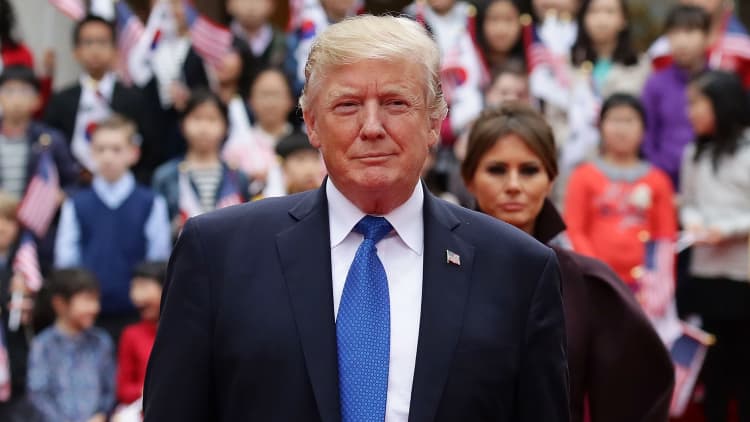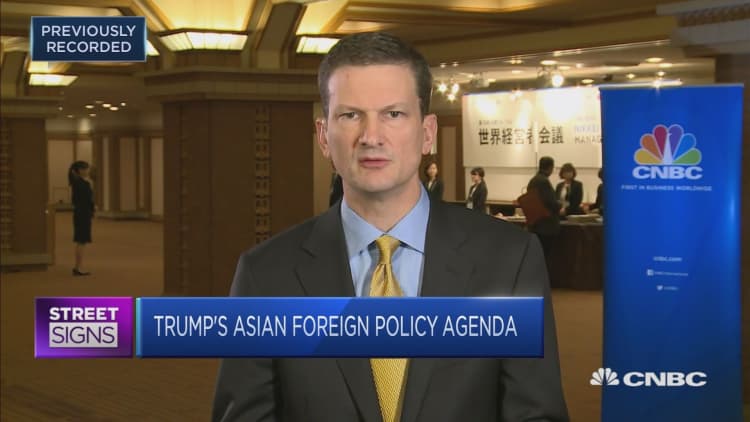
Worries that Washington may resort to unilateral military action on the Korean Peninsula are generating angst in Asia's fourth-largest economy, according to analysts.
South Korean media voiced those concerns ahead of President Donald Trump's arrival in Seoul on Tuesday. The U.S. leader is set to meet with South Korean President Moon Jae-in and address parliament, known as the National Assembly, before leaving for China on Wednesday.
"There's just a lot of anxiety growing in South Korea about where the alliance is headed," said Jenny Town, the assistant director of the U.S.-Korea Institute in Washington and managing editor at 38 North, a website that provides analysis on North Korea. "A lot of South Koreans just feel like they're not part even of the deliberations and as an alliance they are not consulted."
Concerns about potential U.S. military action against Pyongyang increased in September after Trump hinted of force in a tweet. The president also recently said that Secretary of State Rex Tillerson was "wasting his time" on diplomacy.
The world's largest economy has also been flexing its military might in recent weeks: the Navy has three carrier strike groups operating around Asian waters while B-1B bombers have been conducting exercises over the Korea Peninsula.
Moon, who has been pushing for dialogue with Pyongyang, has repeatedly said he wants no military action without Seoul's approval.
"The thing that has been sucking the wind out of the room of North Korean discussion has been, will the U.S. conduct a preventive attack" said Bruce Klingner, former chief of the CIA's Korea branch and now senior research fellow for Northeast Asia at the Heritage Foundation's Asian Studies Center.
According to Klingner, another concern is that the Trump administration will abandon Seoul once North Korean leader Kim Jong Un shows the ability to hit the U.S. with an intercontinental ballistic missile.

In September, Trump referred to Kim as "Rocket Man on a suicide mission" and threatened to "totally destroy" the hermit state.
There's a view in South Korea that Trump is exacerbating tensions by using strong rhetoric and taunting Kim. On Monday, the Korea Herald newspaper carried a story that stated, "What worries people most is Trump's unpredictable style and impromptu remarks."
"Antagonism over trade issues" also exist between Washington and Seoul, said Town. Earlier this year, Trump called the Korea-U.S. Free Trade Agreement a "horrible" deal and threatened to abandon it.
The Trump-Abe factor
Trump's proximity to Japanese Prime Minister Shinzo Abe is also a hot topic in Asia's fourth-largest economy.
The government in Seoul feels that when something happens on North Korea, the "first call Trump usually makes" is to Abe instead of Moon, Town said.
Speaking in Tokyo on Monday, Trump urged Abe's administration to purchase U.S. anti-missile systems to counter the threat from Pyongyang. Several of the rogue state's ballistic missile test-firings have flown across Japan or landed in Japan's exclusive economic zone.
Seoul's Kyunghyang Shinmun daily newspaper's editorial on Monday carried the headline: "Anxiety spreading on the Korean Peninsula by strengthening U.S.-Japan alliance." Japanese defense spending "is a cause for concern and may become an unstable factor in the situation in Northeast Asia and the Korean Peninsula," the story said.
Historically, ties between Seoul and Tokyo have been weighed down by Japan's World War II crimes.


